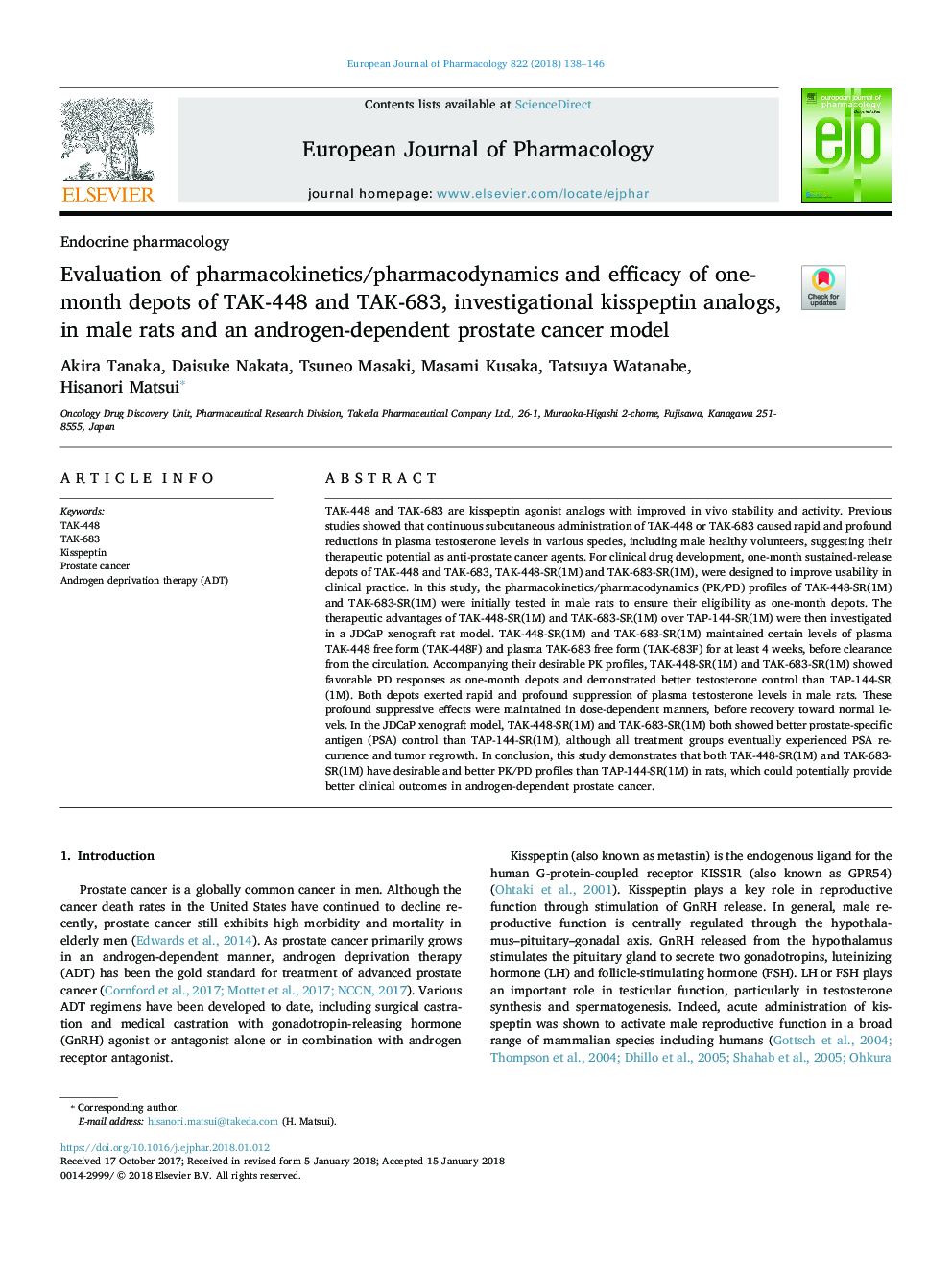| کد مقاله | کد نشریه | سال انتشار | مقاله انگلیسی | نسخه تمام متن |
|---|---|---|---|---|
| 8529417 | 1558858 | 2018 | 9 صفحه PDF | دانلود رایگان |
عنوان انگلیسی مقاله ISI
Evaluation of pharmacokinetics/pharmacodynamics and efficacy of one-month depots of TAK-448 and TAK-683, investigational kisspeptin analogs, in male rats and an androgen-dependent prostate cancer model
دانلود مقاله + سفارش ترجمه
دانلود مقاله ISI انگلیسی
رایگان برای ایرانیان
موضوعات مرتبط
علوم زیستی و بیوفناوری
علم عصب شناسی
علوم اعصاب سلولی و مولکولی
پیش نمایش صفحه اول مقاله

چکیده انگلیسی
TAK-448 and TAK-683 are kisspeptin agonist analogs with improved in vivo stability and activity. Previous studies showed that continuous subcutaneous administration of TAK-448 or TAK-683 caused rapid and profound reductions in plasma testosterone levels in various species, including male healthy volunteers, suggesting their therapeutic potential as anti-prostate cancer agents. For clinical drug development, one-month sustained-release depots of TAK-448 and TAK-683, TAK-448-SR(1M) and TAK-683-SR(1M), were designed to improve usability in clinical practice. In this study, the pharmacokinetics/pharmacodynamics (PK/PD) profiles of TAK-448-SR(1M) and TAK-683-SR(1M) were initially tested in male rats to ensure their eligibility as one-month depots. The therapeutic advantages of TAK-448-SR(1M) and TAK-683-SR(1M) over TAP-144-SR(1M) were then investigated in a JDCaP xenograft rat model. TAK-448-SR(1M) and TAK-683-SR(1M) maintained certain levels of plasma TAK-448 free form (TAK-448F) and plasma TAK-683 free form (TAK-683F) for at least 4 weeks, before clearance from the circulation. Accompanying their desirable PK profiles, TAK-448-SR(1M) and TAK-683-SR(1M) showed favorable PD responses as one-month depots and demonstrated better testosterone control than TAP-144-SR(1M). Both depots exerted rapid and profound suppression of plasma testosterone levels in male rats. These profound suppressive effects were maintained in dose-dependent manners, before recovery toward normal levels. In the JDCaP xenograft model, TAK-448-SR(1M) and TAK-683-SR(1M) both showed better prostate-specific antigen (PSA) control than TAP-144-SR(1M), although all treatment groups eventually experienced PSA recurrence and tumor regrowth. In conclusion, this study demonstrates that both TAK-448-SR(1M) and TAK-683-SR(1M) have desirable and better PK/PD profiles than TAP-144-SR(1M) in rats, which could potentially provide better clinical outcomes in androgen-dependent prostate cancer.
ناشر
Database: Elsevier - ScienceDirect (ساینس دایرکت)
Journal: European Journal of Pharmacology - Volume 822, 5 March 2018, Pages 138-146
Journal: European Journal of Pharmacology - Volume 822, 5 March 2018, Pages 138-146
نویسندگان
Akira Tanaka, Daisuke Nakata, Tsuneo Masaki, Masami Kusaka, Tatsuya Watanabe, Hisanori Matsui,